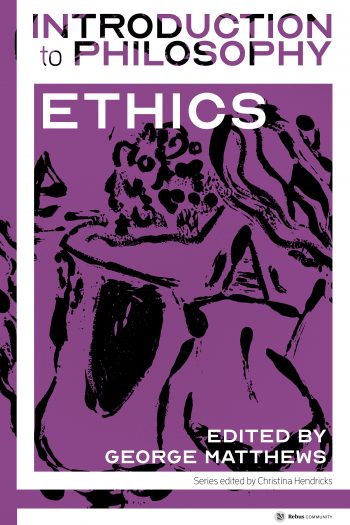I am excited to announce the release of another book in a series of open textbooks for Introduction to Philosophy courses: Introduction to Philosophy: Ethics, edited by George Matthews (Plymouth State University, New Hampshire, USA).

Introduction to Philosophy: Ethics explores many different approaches, both historical and contemporary, to understanding and justifying moral and ethical norms. It addresses foundational questions that have exercised human minds since we first started wondering about how we should live our lives. Each chapter highlights the major lines of argument in philosophical ethics about questions of moral and ethical value.
The book explores a wide range of topics, including moral relativism, the relationship between ethics and religion, virtue ethics in the Western and Eastern traditions, the question of self-interest and ethics, utilitarianism, Kantian deontological ethics, and recent work in feminist ethics and evolutionary ethics. It can be used as a standalone resource for courses that introduce students to topics in philosophical ethics, or it can be paired with readings from historical and contemporary original philosophical works.
There are nine books planned for the Introduction to Philosophy open textbook series, each with its own editor (I am the series editor). This is the second book in the series; Introduction to Philosophy: Philosophy of Mind has already been released, and Logic, Philosophy of Religion, and Aesthetics are not too far behind. There are also books in progress on Metaphysics, Epistemology, Philosophy of Science, and Social and Political Philosophy.
The books are written for an audience of students with little to no background in philosophy, without jargon and with potentially unfamiliar concepts explained. They are designed to help students gain the necessary foundations in particular philosophical areas in order to be able to pursue further study in those areas if they wish.
Each book has a Creative Commons Attribution license that allows it to be reused free of charge, or downloaded and revised/remixed to better fit one’s own context. For example, instructors are welcome to combine a few chapters from multiple books, adding in their own work or other openly-licensed or public domain content, to create their own customized textbook.
Please see the project discussion pages on the Rebus Community platform for further information about the series, including opportunities to volunteer to help out with the other books. We also welcome questions or comments on the books or the project as a whole in that discussion space. If you plan to adopt part or all of any of the books in the series, please let us know on our adoption form!
